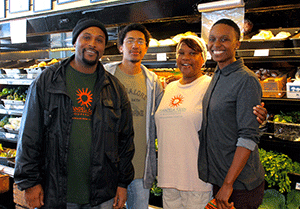
In the piece, Walker invited comment as he and his colleagues work to articulate a new and improved “gospel of wealth” for our time.
Responding to his request for open debate on this topic, my post aims to share perspectives from one of the nation’s most impoverished and inequitable regions, and from an organization that is also working to address these daunting challenges.
First, I agree that there is an inherent tension between the economic capitalist system that generates the wealth that fuels philanthropy, and the philanthropic purpose of improving the lives of people who are “the losers” in that system.
As Walker notes in his piece, leading thinkers and organizers in marginalized communities have long argued that fundamental changes to the capitalist economic system itself, not merely charitable giving, would be necessary to eradicate inequality. And, that as long as economic inequality persisted, the promise of our democratic political system would remain shamefully, and, ultimately, dangerously, unfulfilled. “Equality is the heart and essence of democracy, freedom, and justice,” declared A. Phillip Randolph, an African American union leader, in a 1942 speech.
As Walker also notes in his piece, we have much more experience with capitalism, and evidence that it exacerbates inequality, in 2015, than did Ford’s philanthropic forebears when they embarked on the project of modern philanthropy.
Thankfully, we now also know more about solutions–in particular, cooperative economic institutions, an alternative economic arrangement that is as old as capitalism itself.
With independent origins in Europe and Asia, cooperatives were an adaptive response from the people who lacked access to the winning ticket of capitalism: money (capital).
Some entire groups of people, such as African Americans or Jewish people, lacked access to this winning ticket because of discrimination, which was often reinforced by political institutions and state-sponsored violence. Others, such as farmers or timber cutters, were geographically isolated from the market.
So not only did marginalized groups face barriers to entering the wealth-generating aspects of capitalism, they were victims of capitalist market failures that left them subject to the destructive practices of price gougers and profiteers. Disconcerting parallels continue today, as predatory lenders disproportionately target vulnerable populations, such as low-income, minority and elderly residents.
Cooperatives are a powerful response to the problem of inequality because equity is baked into their very structure. A member has equal ownership, voting rights, and benefits from the cooperative, whether it is organized to provide fair-priced consumer products, seeds, farm equipment, housing, health insurance or affordable financial services.
The African American community in the United States has a rich history in cooperatives from burial associations to farm cooperatives to grocery stores.
African American leaders as varied as W.E.B. DuBois, Randolph, Ella Baker, Fannie Lou Hamer, and John Lewis have argued that cooperatives offered opportunities that capitalism alone has not.
“We unwittingly stand at the crossroads—should we go the way of capitalism and try to become individually rich as capitalists, or should we go the way of cooperatives and economic cooperation where we and our whole community could be rich together?” DuBois asked at a conference in Atlanta in 1907.
Today, the Ford Foundation, at its FordForward crossroads, has an opportunity to invest in cooperatives in the United States and in the rest of the world. In doing so, Ford would not only promote equality, but also challenge the notion that capitalism is a natural ally of democracy.
(Photo credit: Members of the Mandela Foods Cooperative)





Cooperatives, ESOPS, and the like are great. However today’s economy is dominated by corporate giants, almost all being strictly capitalist in nature. Therefore we need stakeholder ownership of all big corporations, say, all worth more than 1 billion or with sales of more than 1 billion. Stakeholder ownership would always mean substantial ownership by one or more levels of government, from local to global. In addition it could be partial employee, customer, or supplier ownership (as in cooperatives). And possibly minority ownership by pension funds, private interests, or other entities. Another form of public ownership would be partial or full ownership be individual citizens – share one person – like the Alaska Permanent Fund. Such universal equity of wealth, constitutionally guaranteed, seems to be the only way toward a permanently egalitarian society.